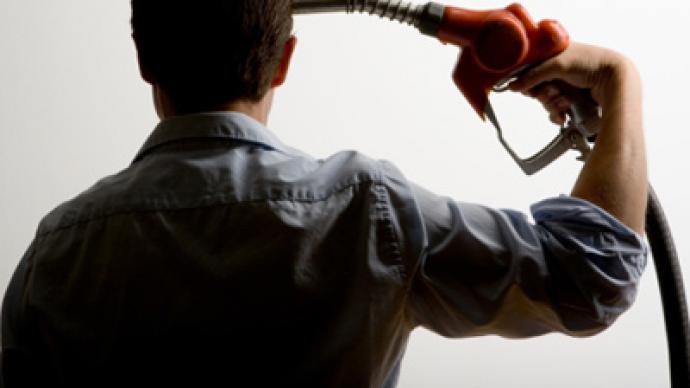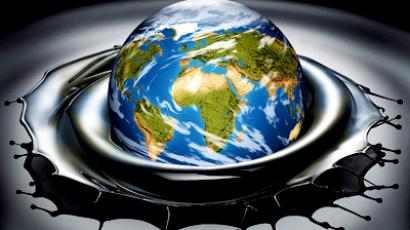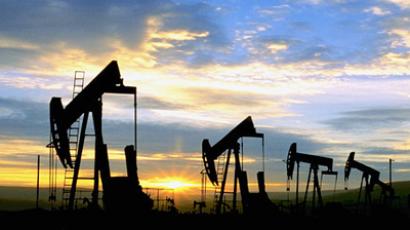Pricing probe on oil majors

Russia's anti-monopoly watchdog has opened a formal investigation into three of the country's top oil producers for price fixing.
That's after Prime Minister Putin questioned why prices for jet fuel and diesel set by Rosneft, Gazprom and Lukoil have risen faster than the price of crude oil. Two years ago the anti-monopoly watchdog imposed fines of nearly a billion dollars against the likes of Rosneft, Lukoil and TNK-BP for fixing prices in the oil products market. Business RT spoke with Konstantin Simonov, General Director of the National Energy Security Fund about the issues involved.RT: How serious is this antimonopoly probe against the oil companies?KS:“You know, this story is not new, so every year, we have the same picture, and unfortunately it is the same dialogue.Prime Minister Putin says ‘why are oil prices so high?’ oil companies usually say ‘Ok, there will be no more increasing of oil prices’ our antimonopoly watchdog is usually saying ‘now we will really press on them’ but I think the problem is the structure of our oil industry.Because it is not a secret that we have so called vertically integrated oil companies.It means that from oil wells till petrol stations, it is still the property of one company.That is why, if you have no independent refinery, usually you have the same situations.This is why, maybe, today, our antimonopoly watchdog will be more serious and more tough in this dialogue with oil companies.But if there will be no independent refineries, which is not included to big oil companies, I am absolutely sure that its not our last dialogue in this programme about this problem.”RT:And still people questions why are fuel prices in a country that exports oil so high?KS:“I cannot agree with you.We have some oil exporting countries, for example Norway, in which petrol prices are 2 or 3 times higher.That’s why we have, of course, Gulf countries, which really fuel is very cheap, but in some countries, as Norway, petrol is more expensive than in Russia.But it’s not good, I think, if our oil companies say you have Norway – in Norway oil, petrol prices is cheaper.The reason, in my opinion, so even if we have oil exporting countries in which petrol are more higher.The reason really, as I said, is absolutely a normal structure of our oil industry.I think we can use an example of United States, in which we also have big upstream companies, but in United States they also have independent refineries, and that is why they have real competition in this market.In Russia we have no competition – it is the main problem.”RT:But speaking of this probe, we know that the government has stakes in these companies.How transparent do you think this probe will be?KS:“Yes, of course, our main producing company, Rosneft. In Rosneft our government has more than 35, more than 80% even.But now we see the process of privatization.That is why I cannot agree, for example, if argument that we have in Russia during the last ten years, we have the process of nationalization.Yes we have the process of nationalization, but during the last several years, we began the process of privatization, and there is official plans to sell even more than 50% of Rosneft company. So it means that yes, our companies will be more and more private, the share of private investors will be more serious in our oil industry, but the problem is not transparency, as I said.If you have private property, but the structure is the same – if you are a private proprietor of the same business from oil well to petrol station – there will be no change in the system of pricing.¨RT:We know that the government has recently fined Lukoil and Rosneft for these price fixing.Why didn’t they learn their lesson?As you said, we are seeing that year on year, but why?KS:“It’s an excellent question, because we must go into details and see the reality.Because during last year, the head of our antimonopoly watchdog, Mr Artemyev, said that there will be, as he said, Russian standard oil deal.So he promised to us, Russian citizens, that he will be as cool as the American watchdog with Standard Oil, and we know the result of this story.There was, as I said, there was split of Standard oil into several pieces. But we have no splitting of our oil companies, we have no disintegration of these big monsters.And fines, at the end you can see the result, so fines, they were not so high – approximately 1% of their incomes.So, that is why antimonopoly watchdog, at the end of this year, was not so tough with our oil companies, and that is why I cannot say that they paid a huge amount of money, and as you said, I cannot say it was not a serious lesson for our oil companies, because their fines were not so, in reality, not so high.”RT:And looking at a slightly different issue, will the tax reform proposed for the sector basically raise investment in production?KS:“Also an interesting question, because usually we know that we have very high taxes on oil companies, but in my opinion our state – it was like the compromise – high taxes but possibility for our oil companies to sell petrol for more high prices to our citizens.Now our government is promising that taxes on oil companies will be going down, so that is, in this case, maybe, we will have another compromise.Maybe not so tough taxes, but decreasing of petrol prices on our domestic market.But let’s see.Now there are a lot of discussion about the new tax system but still we have no tax system.Maybe from the next year really we will have new tax system.”














